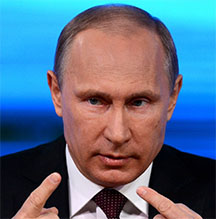MOSCOW, (Reuters) – Russia’s central bank offered yesterday to help leading exporters refinance foreign debts next year, expected to be one of the toughest of President Vladimir Putin’s 15-year rule for the economy due to Western sanctions and a plunge in oil prices.
The bank said it would lend dollars and euros to major companies that were willing to put up their foreign borrowings as collateral.
The move means the state will in effect take on credit risk for the companies, whose foreign debt obligations have shot up in rouble terms because of the currency’s sharp slide this year.

Even before the move, Standard & Poor’s ratings agency put Russia’s sovereign credit outlook on “creditwatch negative”, meaning it could be downgraded to junk as soon as January due to a “rapid deterioration of Russia’s monetary flexibility”.
S&P, Moody’s and Fitch all now rate Russia one notch above junk. The Finance Ministry said it was holding talks with ratings agencies to explain the situation in the economy.
The authorities have taken several steps in recent weeks to arrest the rouble’s slide and avoid a spike in inflation after years of stability, developments that could threaten Putin’s popularity.
They include a sharp interest rate hike, curbs on grain exports and informal capital controls.
While Russia’s sovereign foreign debts are minimal, state and private companies and banks have accumulated $600 billion in foreign debts, of which around $100 billion are due next year.
The ability to repay the loans or roll them over has been severely reduced this year by Western sanctions, imposed on Russia for its actions in Ukraine, which effectively shut its companies and banks out of Western debt markets.
But the economic crisis in Russia’s heavily oil-dependent economy goes wider. Moody’s ratings agency said on Tuesday that it expected Russia’s GDP to contract by 5.5 percent in 2015 and 3 percent in 2016, under the effect of the plunge in oil prices and the rouble’s slide.
“These developments will likely lead to a severe deterioration in the operating environment for Russian corporates, namely higher inflation, unemployment and debt-servicing costs as well as lower domestic demand, resulting in a deeper and more protracted decline in domestic economic activity than previously anticipated,” Moody’s said.
Russia has around $414 billion in foreign exchange and gold reserves, down from around $510 billion at the start of the year, after spending heavily to prop up the rouble as the price of oil, Russia’s main export earner, almost halved from this year’s peaks in June.





